- Products
- Solutions
- Services
- Resources
- Customer Success
- Company
- Sign In
- Contact Us

Digital Transformation enabler helping enterprises evolve by connecting technology
Take a look at upcoming webinars and special events
HokuApps news and media coverage
Be with the best. Solve real problems
Get in touch with our experts here
Explore our extensive collection of online resources here
Information and insight on transformation to the Digital Workplace
Quick Guides provide concise information on a variety of topics
Discover the essence of HokuApps’ products
Learn all about HokuApps’ cutting-edge enterprise mobility technology

15The trend of enterprise mobile apps has, over the past decades, shifted its status from disruptive to constructive. Almost all major businesses today are leveraging mobile application development platforms (or are vying for) to grow their scope of influence and thus widen their horizons. Mobile apps have completely changed the way businesses interact with their target market, through flexibility, versatility, and overall usability that they bring to the table.
In the competitive scenario of today, businesses must adapt in order to move forward and stay on top of things. Additionally, the influx of various new forms of technology has created a highly volatile environment, one that is changing constantly and at an unprecedented rate. With apps making the lives of people easier, and consequently giving impetus to businesses at relatively low costs; the playing field seems to have become more or less level.
It is for all the above reasons that business owners such as yourselves are seriously looking to invest in mobile application development platforms. This, however, is not a very easy task, as mobile apps do present an investment on your part. Additionally, there are several factors that must be looked into with great scrutiny, which calls for a heavy investment of time as well.
And although there are umpteen ways in which to approach your own enterprise app development project, a commonly agreed upon ‘first’, would be to keep track of the major trends, both present, as well as upcoming.
Here are 5 trends that are influencing the enterprise mobile application development industry in 2018:

One of the greatest utilities of mobile application development platforms is that of high user convenience. Over the past 5-6 years, the services industry has slowly and steadily, sunk its roots into mobile app development, through highly functional on-demand apps. These apps include online shopping (clothes, groceries, etc.), transport services, and more. The trend of on-demand apps is still rising, with more and more industries are embracing its smart long-term benefits. As a business owner, you must consider leveraging the huge business potential that on-demand apps bring to the table, especially if you work in any one of the industries that are directly relevant to them.
A new and cutting-edge solution that is paving the way forward is low-code mobile app development platforms. On the HokuApps platform, apps are created by on an automated platform that comes equipped with pre-configured business modules and pre-connected technology components. Components are the integrated to business modules via a ‘drag and drop’ method to create apps at rapid speed. This nullifies the need for hand-coding from scratch as traditional app development requires. Thus, increases time-to-market by 10 times. The app is then customized to suit an organisation’s hierarchical architecture to deliver highly customized technology solutions.
Accelerated Mobile Pages (AMP) is a website publishing tool, that was initially launched in 2015. This open-source library-based initiative offers a highly lucrative business proposition to all industries. The reason for this is that this technology is built to enhance the loading time of pages for mobile sites, something that is known to boost user engagement by reducing bounce rate, and enhancing CTR, rankings, etc. This technology is applicable to all types of applications, thus making it a prudent choice for your mobile application development project.

Cloud-based computing has been around the block a couple of times now and has been established as a credible data storage function. Applications of Cloud computing to mobile apps, helps users to better manage the storage of large chunks of memory. This also unburdens the performance of the users’ devices, by storing physical memory in the online space, rather than in the device itself. As a business owner, you must ensure that your mobile app development platform makes room for Cloud integration, thus helping you leverage its features to boost app performance, as well as user satisfaction.
The wave of IoT (Internet of Things) technologies has spread on a global scale and is estimated to cross 600 billion USD by 2021. One of the major offshoots of this trend is that of wearable smart technology devices – mainly comprising watches. These devices (aptly named smartwatches) can do a lot more than simply telling you the time, with features such as caller ID and notification display, voice commands, etc. Smartwatches act as extended individual utilities for mobile phones, and can therefore by extension, also do the same for mobile apps. Wearable devices are all set to become a mainstream integrated component for mobile app development platforms.
Virtual, and augmented reality – although currently emerging trends – is set to become a part of mainstream technology consumption in the coming years. The implications in terms of user experience, innovative concepts, and overall profitability for businesses are quite staggering. Being comparatively new, these technologies currently require large capital investment with traditional mobile app development technology. With growing demand and subsequent upscaling of production, however; AR and VR will come within the reach of more and more businesses. HokuApps offers all these ‘trends’ as a part of its mobile app development solutions.
The main reason for this is that the HokuApps platform is an automated one, where 90% of the process is pre-configured with business modules and pre-built technology modules like GPS, IoT, maps etc. that are pre-coded to an in-built connector with more than 500 connection options. The remaining 10% is the part where the app is customized to suits a business’s unique hierarchy. The result is on-demand mobile apps that are cross-platform, affordable, reliable, and includes features like secure chat, enterprise administration backend with a granular reporting engine and security at every level.
Contact us to know more.